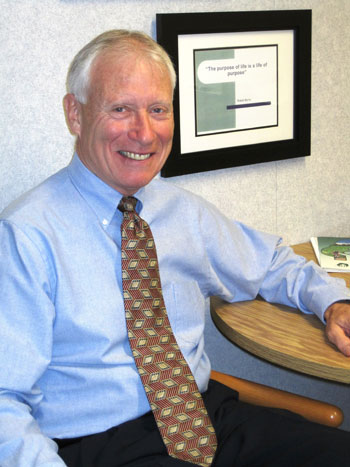
Doug Brimacombe's term as senior liaison between the tri-partite agreement partnership has been a productive one. His successor will spearhead future efforts.
When you have a truly collaborative team at the table you can not only 'dream big' as the saying goes, you can also do big things. In fact, so successful has the Faculty's Memorandum of Understanding been with Alberta Recreation and Parks Association (ARPA) and the Government of Alberta's Tourism, Parks and Recreation ministry over the three years since inception, that ARPA , with support from the Faculty, has set its sights on creating a Centre for Community Recreation Excellence.
It's a point of pride for Doug Brimacombe, who has served as the Senior Liaison Officer with the MOU's stakeholders. "For the past 18 months we've been fleshing out the notion of establishing the Normie Kwong Centre for Community Recreation Excellence," says Brimacombe. While the centre, imagined as a hub for community recreation research, knowledge dissemination and promotion in Canada, is a fledgling idea, it's also a metaphor for the participatory nature and powerful ties resulting from the MOU and the successful partnership it's engendered.
"This has been the first experience I've had with genuine collaboration - where all parties came to the table interested in identifying and addressing the needs of the recreation and parks field as well as sharing knowledge and creating and forging strong links between the university, industry and government," says Brimacombe, who'd had years of experience in local government and charitable organizations prior to accepting the three-year post.
The agreement, first hammered out between former Dean Mike Mahon, former Deputy Minister Bill Werry and Rick Curtis, recently-retired Chief Executive Officer of ARPA, and now in the hands of their successors Dean Kerry Mummery, William Wells, ARPA's new CEO, and Deputy Minister Brad Pickering, was in response to their mutual desire to create closer ties between their organizations and foster deeper dialogue with respect to collaborative research, professional and curriculum development, opportunities for graduates of the faculty's programs, dissemination of knowledge, policy development, and to spur special initiatives.
One of the partnership's major projects, spearheaded by ARPA, was to stage a National Recreation Summit to help formulate a national agenda for recreation and leisure. Ideas and materials arising from the Summit, which took place last year, "will go to ministers responsible for recreation in the country in 2013, when an agenda will be advanced for their consideration," says Brimacombe.
Knowledge about community recreation and leadership in recreation and leisure organizations is becoming increasingly important, says Brimacombe, given that "80 to 90 percent of the graduates of the recreation degree, and other recreation programs elsewhere in Canada end up in community recreation."
Since the 70's community recreation has grown to make up a significant portion of a municipal government's spending. "The annual expenditure on recreation and parks by local governments is always the highest or second highest in every city and town in the country," he says.
In the classroom Brimacombe, who teaches three recreation and leisure courses, has made a concerted effort to get to know the students in the classes he teaches and to mentor them. Consequently, a larger number of students now attend the annual ARPA conference. "Whereas there used to be two or three attending in the past, we've had over 20 of them each year since we began this partnership," he says, adding that students are more aware of the importance of networking with, and connecting to, leaders in their field of study both for practicum experiences and as potential employers.
Besides student engagement, recreation and leisure researchers have delivered presentations at the ARPA conference as has Brimacombe who also delivers presentations and lectures to interested recreation and leisure organizations in Canada and the U.S.A.
Brimacombe says there are closer connections now between university, industry and government than ever before in this field. "We have a Liaison Group which determines the priorities for the tripartite partnership. One of its early decisions was to broaden the base of involvement by each of the partner organizations. Accordingly, the Champions' Group was formed. Each year during the AROA Annual Conference, this group has convened to talk about the tri-partite agreement and what we've accomplished - and last year the minister was at the table. That's gratifying."
Tom Hinch, Associate Dean, Community and International Engagement, agrees. "This agreement has resulted in all partners to the MOU having a deeper awareness and respect for each other's contributions, relevance and challenges. And certainly a key outcome has been Doug's position, which is jointly funded by the partners and to which he's brought his immense passion for, and experience in, community recreation."
Looking to the partners' focus for the next three years, Brimacombe, who steps down to retire in June, says the Normie Kwong Centre for Community Recreation Excellence will be a prime focus to be developed under the auspices of the Recreation for Life Foundation, a sister organization to ARPA.
And while Brimacombe will be out on the links when these dreams come to fruition, he says it's been an incredible three years helping the MOU grow. "It's been such an honour," he says, "such a privilege to participate in its birth. It's been like experiencing the birth of a grandchild!"